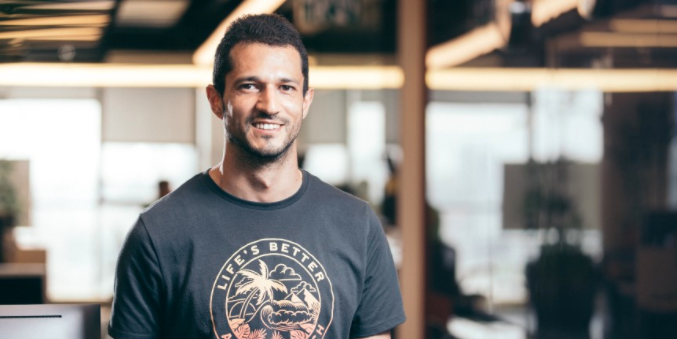How Software Engineering Manager Karim Fanadka Found New Ways to Succeed and Help Others Do the Same

Karim Fanadka is a software engineering manager on the Einstein AI DevOps Red team at Salesforce in Tel Aviv where he sees his role as a kind of tech firefighter. “We are trained to come to the rescue when there is a crisis — to design, prepare, and develop solutions to problems before they become full-blown fires.”
Karim is also a global MBA student, taking the Innovation and Entrepreneurship track at the Interdisciplinary Center (IDC), focusing on technology, design, media, psychology, business, and science.
Attracted to Salesforce for its focus on giving back to the community and responsible leadership, Karim is passionate about providing incredible customer experiences.
“We use cutting-edge technologies to deliver the best possible AI platform so our customers can analyze and interpret their data faster than ever before. That makes me feel so proud.”
The South Pole is on this adventurer’s bucket list but, in the meantime, he’s excited to explore Tel Aviv, the city he calls home. Each day starts with the preparation of his beloved Arabic coffee, which he shares with his colleagues — a gesture of the kind of cultural exchange Karim thrives on.
Here, Karim shares the learnings on his path to a tech career and his volunteer work to build diversity in tech.
Feeling at Home Anywhere in the World
The world is so huge — I want to see all of it! I am inspired by unique cultures and love to have insights into our varied ways of life. I believe one of the most valuable things we can do is learn about other cultures, celebrate each other’s differences, and find ways to come together.
One of the things I love about working at Salesforce is that there is space for everyone, whatever your background. Difference is celebrated because diversity lifts all of us up. Salesforce is truly a global community. Today I work in Tel Aviv but I know that in this organization I would be made welcome wherever I was.

I am an Arab living in Tel Aviv and working in tech, so I have some experience of what it’s like to be the “only one” in the room. Arabs make up about 20 percent of Israel’s population, but 12 years ago only about 350 worked in tech. Today that number is 6,600 — an amazing increase — but tech is still considered an unusual job choice in my culture. The expectation is that we will go into jobs seen as more traditionally stable, like the public sector or medicine.
Building Bridges with Patience and Persistence
Even though I wanted to study computer science, I went to study medicine in Italy. I realized very quickly that medicine wasn’t for me and returned home after a few months. I love and respect my culture, but generally speaking it is not very accepting of “failures.” I’ve come to learn that failure can be an opportunity to know myself better and to make a positive change, but the decision I made to stop studying medicine and come home was not well received.
It was tough, and it got tougher before it got easier. I studied computer science and started working in tech — I was doing well in my job and things were looking up. Then one day I was laid off with 500 other engineers. For some, this was seen as another failure.
“That world is not for you,” I was told. “Go and work in a bank.” But I persisted. For 10 months I contacted every company I knew in Israel, until I finally found a position with a global tech company.
Today, those “failures” are stories I share with others who are looking for opportunities outside the ones traditionally seen as suitable for them. We have a tendency to want success straight away. So I suggest taking it easy and being patient — you don’t have to be CEO within a week! It’s okay to make some mistakes along the way and try different things.
I blog regularly about my experiences and am also interviewed often for radio and television shows that have Arab audiences here in Israel. These are great platforms for sharing my messages and connecting with others who might be facing similar challenges. It’s important for underrepresented groups to see themselves in these jobs, and to know what opportunities are available to them. Salesforce empowers me to set that example by helping me share my story and bring it to other students and aspiring tech professionals.

And I’m always looking for ways to bring the communities in Israel together. There can be so much wariness between our cultures, but all cultures are so rich and have so much to give and share. I want to be a bridge-builder.
I’m excited, for example, to volunteer for Tsofen, a non-profit organization in which Jewish and Arab professionals work together to develop the high-tech sector in the Arab community. Salesforce’s 56 hours of volunteer time off (VTO) each year encourage me to volunteer. I don’t feel that I need special approval to take time and give back. I visit universities to share my story, prepare students for their next steps, and host students on-site.
I love being part of an organization that recognizes the importance of diversity and helps me not only succeed professionally, but gives me the time and the resources to contribute to programs and projects that can make a difference for the better.
That, to me, is success.
Editor’s Note: Karim is now Senior Manager, Software Engineering
